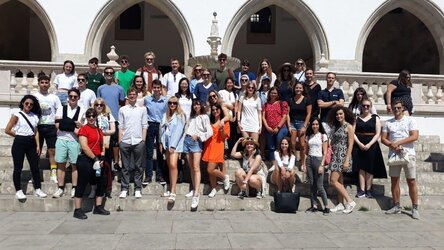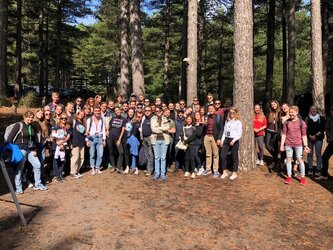General structure
The details contained in this page are generally applicable to the ESA/ECSL summer course on space law and policy. However, modalities vary each year depending on the host venue.
Who can participate?
The ECSL Summer Course is open to students and young professionals citizens of or residing in ESA Member States, Associate Members and Cooperating States. Applications from other countries are considered on a non-priority basis.
Past participants have come from all over Europe and beyond, including Austria, Belgium, Brazil, Bulgaria, Czech Republic, Denmark, Finland, France, Germany, Greece, Hungary, Italy, Iran, Ireland, Luxembourg, Netherlands, Norway, Poland, Portugal, Romania, Russian Federation, Serbia, Slovakia, Slovenia, South Korea, Spain, Switzerland, Thailand, Ukraine, United Kingdom and more.
Course outline and structure

The course lasts from ten days to two weeks and usually starts in the second half of August or the first week of September, depending on the calendar of the host institution.
Lecture times vary from 45-90 minutes and participants can expect several lectures per day during the week, except on those days which have been set aside for a space-related workshop, national activity, conference or excursion. Lectures take place at the host faculty or institution.
After the last lecture in the afternoon, participants are encouraged to participate in social events, and after the announcement of the group project, to meet in their working groups to continue progress on their group project (see below).
Each year the course is structured around several central components:
- First: a general introduction to the sources and principles of space law.
- Second: a series of lectures concerning the legal aspects of specific space applications or activities as well as recent developments in space law and policy. In this way, each summer course has unique themes.
- Third: participants are split into working groups to prepare a group project. The aim of the exercise is to combine the teaching content of the course with independent research. The groups should benefit from the assistance of tutors, lecturers and organisers. At the end of the course each group shall present their work to a jury panel. Participants are challenged to defend their positions and demonstrate their grasp of the applicable law and policy.
In the past, group projects have included preparations for a Model UN COPUOS simulation, business related pitches and other project concepts. The group project changes annually. The jury panel can be made up of ECSL Board Members, ESA staff, industry professionals or other experienced individuals in the space sector.
Resources
Where applicable, students have access to the host institution's library. In addition, the students will receive via email a number of documents to read prior to the course. These will include a collection of all the major space treaties and other UN legal instruments. We strongly recommend that students bring these materials to the course, if possible in electronic format for environmental reasons.
The ECSL will try to arrange access to printing and photocopying facilities for participants, subject to the modalities of the host institution. The ECSL cannot guarantee the sufficient availability of computers on site and therefore strongly advises each participant to bring their own laptop with the resources on site. However, a laptop computer is NOT a prerequisite to attend the course if you do not own one. In doubt, please address your questions to ecsl@esa.int and we will get back to you as soon as possible.
Transportation
All participants are responsible for organising (and financing) their own transportation to and from the summer course destination.
Participants are asked to pay special attention to any visa requirements that may be in place. After your acceptance, you may liaise with the ECSL Executive Office under ecsl@esa.int on any such matters where you might require assistance, and will receive support to the extent feasible for visa application and other matters.
Accomodation and meals
The nature of the accommodation varies each year depending on the venue. Generally, all student participants (including tutors) stay in single, double or triple rooms at a hotel, hostel or university residence halls. You will be informed of the modalities after your acceptance. Generally, accommodation should be only a short walk or bus ride away from where the classes will take place. Young professionals are encouraged to organise their accommodation close to the location of the classes, and will be provided with some suggestions after acceptance.
The ECSL will usually provide lunch or breakfast and lunch for all participants. Other than that, participants are responsible for their own food and other living expenses. The students will be informed in advance of the kitchen facilities in their accommodation.
Rules & Certificate of attendance
Participants of varying age, gender, nationality and backgrounds are all working and collaborating towards with shared goals at the summer course. The atmosphere has always been one of respect, tolerance and openness. Students, tutors and faculty all socialise after classes and it is important for students to have fun whilst on the course. Situations related to bullying or other forms of intolerance may lead to expulsion from the course.
However, this should not come at the expense of the educational goals of the course. Attendance at lectures is compulsory (90%). Students who fail to attend lectures or participate in their working groups may not receive their final certificate of participation.















 Germany
Germany
 Austria
Austria
 Belgium
Belgium
 Denmark
Denmark
 Spain
Spain
 Estonia
Estonia
 Finland
Finland
 France
France
 Greece
Greece
 Hungary
Hungary
 Ireland
Ireland
 Italy
Italy
 Luxembourg
Luxembourg
 Norway
Norway
 The Netherlands
The Netherlands
 Poland
Poland
 Portugal
Portugal
 Czechia
Czechia
 Romania
Romania
 United Kingdom
United Kingdom
 Slovenia
Slovenia
 Sweden
Sweden
 Switzerland
Switzerland



































